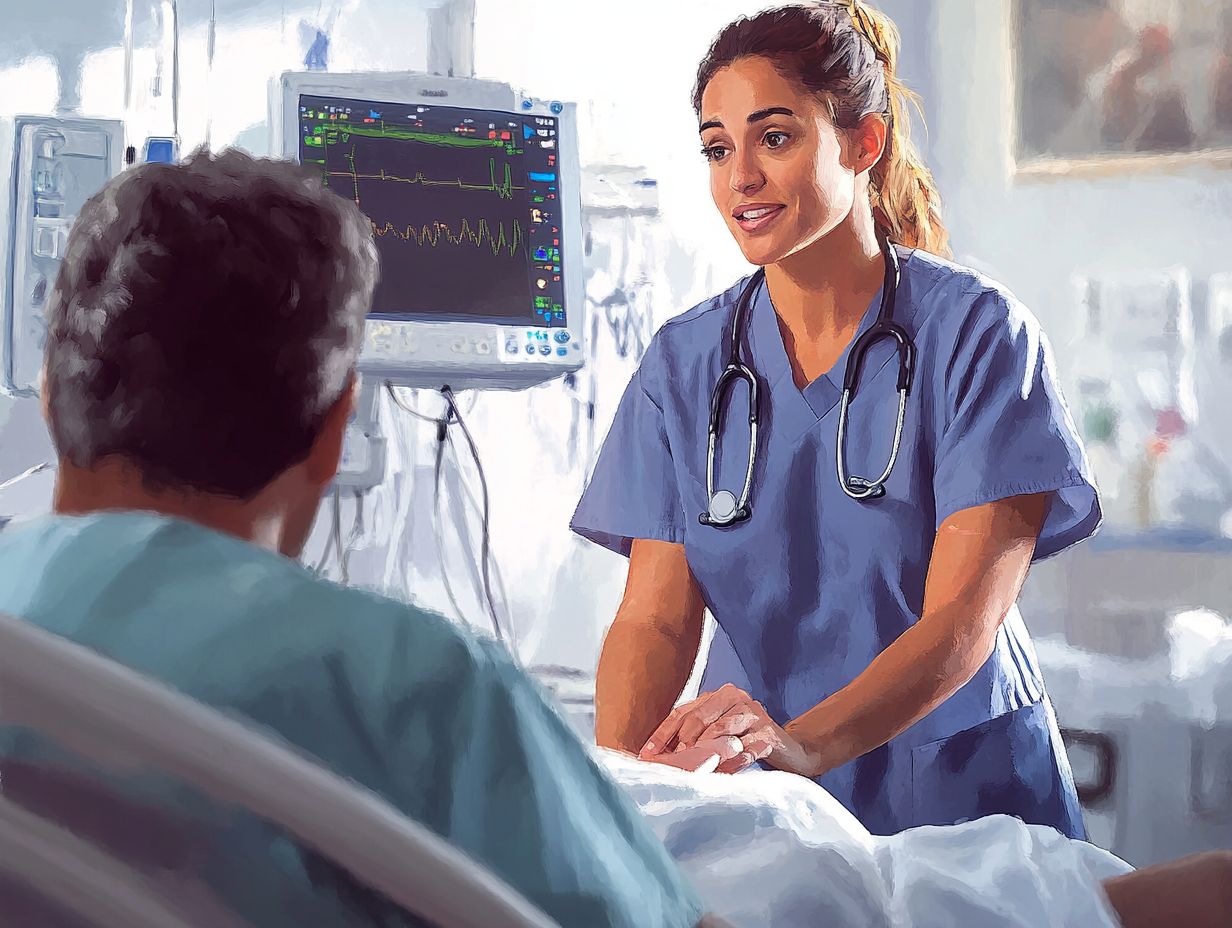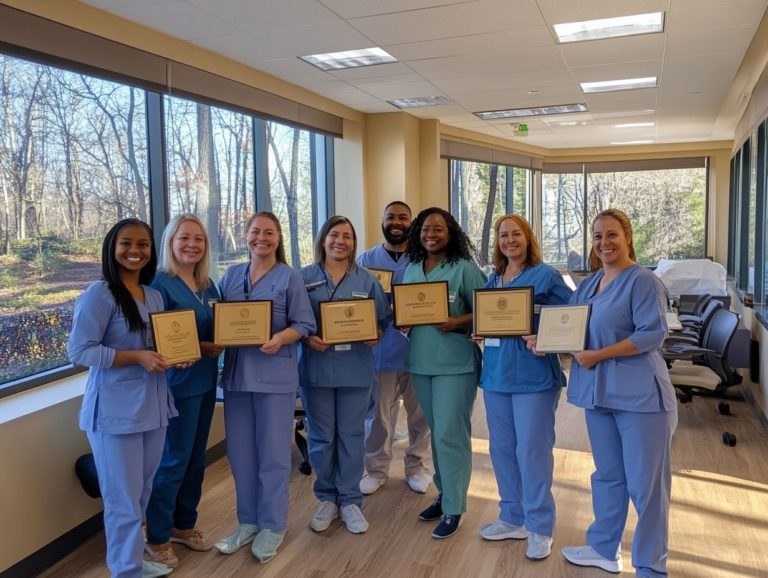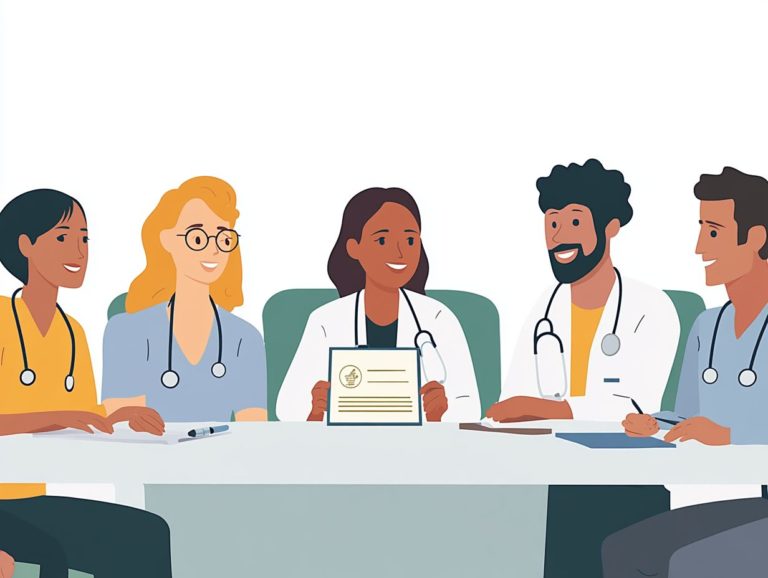Understanding the Role of a Licensed Practical Nurse
Licensed Practical Nurses (LPNs) hold a pivotal position in the healthcare system, providing important care to patients in different places.
This article delves into the key responsibilities that define the role of LPNs, outlining the necessary education, training requirements, diverse work environments, and essential skills for their success.
It also examines the challenges and rewards inherent in the profession, highlighting opportunities for career advancement. Whether you’re considering a career as an LPN or seeking to deepen your understanding of this vital profession, this guide provides valuable insights.
Contents
- Key Takeaways:
- What is a Licensed Practical Nurse (LPN)?
- Education and Training Requirements
- Work Settings for LPNs
- Skills and Qualities of a Successful LPN
- Challenges and Rewards of Being an LPN
- Career Advancement Opportunities for LPNs
- Frequently Asked Questions
- What is the role of a Licensed Practical Nurse (LPN)?
- What are the primary job duties of a Licensed Practical Nurse?
- What qualifications are required to become a Licensed Practical Nurse?
- What settings do Licensed Practical Nurses typically work in?
- What skills are essential for a Licensed Practical Nurse to possess?
- What is the difference between a Licensed Practical Nurse and a Registered Nurse?
Key Takeaways:
- LPNs are licensed healthcare professionals who provide direct patient care under the supervision of registered nurses or physicians.
- To become an LPN, one must complete an accredited training program and pass a licensing exam.
- You will need ongoing education and training to keep your license.
- LPNs can work in hospitals, nursing homes, and home health care.
- They must possess strong clinical skills, communication skills, and empathy to succeed in this role.
What is a Licensed Practical Nurse (LPN)?
A Licensed Practical Nurse (LPN) is a critical member of the healthcare team, offering essential patient care under the guidance of registered nurses (RNs) and physicians.
As an LPN, you are trained to carry out a variety of medical tasks, monitor vital signs, and assist in enhancing patient comfort. Your role is crucial within healthcare environments, ranging from hospitals to nursing homes, where you will blend both clinical and administrative tasks.
Defining the Role and Responsibilities
The role of an LPN involves a diverse range of responsibilities essential to patient care, encompassing both medical tasks and emotional support.
You expertly take vital signs, monitor patients conditions, and assist individuals with daily living activities, ensuring that each patient s needs are met comprehensively.
You engage with patients on a personal level, fostering relationships that can significantly enhance the healing process. Effective communication skills are crucial, as you not only relay vital information between patients and healthcare teams but also cultivate an environment of trust and compassion.
Connecting with patients makes a big difference in their care, allowing them to feel valued and understood throughout their care journey.
Education and Training Requirements
Becoming a Licensed Practical Nurse (LPN) involves immersing yourself in a comprehensive nursing program that blends classroom learning with hands-on clinical experience.
You will finish this training by passing the National Council Licensure Examination for Practical Nurses (NCLEX-PN). This exam licenses LPNs to practice nursing and ensures you are well-prepared to deliver exceptional patient care across various healthcare environments.
LPN Programs and Licensure Exams
LPN programs differ in duration and structure, yet they all share a common goal: preparing you for the NCLEX-PN, the essential exam for licensure.
These programs are presented in various formats. Traditional in-person classes provide invaluable hands-on experience and direct interaction with instructors, while flexible online options cater to your busy lifestyle, allowing you to integrate work and study.
Each program is tailored to meet state-specific requirements, ensuring compliance with local regulations that can significantly influence the curriculum and laboratory experience.
Many graduates pursue additional qualifications, such as LVN certifications, to broaden their career opportunities and enhance their skills. It’s crucial for prospective nursing students like you to grasp these variations and how they will impact your future licensing and career pathways.
Work Settings for LPNs

As a Licensed Practical Nurse (LPN), you have the opportunity to embark on a fulfilling career across a range of healthcare settings. Whether in hospitals, nursing homes, or home health care, you ll engage in a dynamic blend of clinical and administrative tasks specifically designed to suit each environment.
Transforming Lives: The Role of LPNs
LPNs, or Licensed Practical Nurses, work in various facilities, with hospitals and nursing homes at the forefront, providing essential support to the healthcare team.
In hospitals, LPNs play a key role in patient care, administering medications, monitoring vital signs, and assisting with daily activities. Their presence helps ensure that patients feel comfortable and informed about their treatment plans.
In nursing homes, these skilled professionals focus on personal care, helping residents with grooming, feeding, and mobility activities that significantly enhance quality of life.
The dynamic interactions between LPNs, registered nurses, physicians, and other staff members create a collaborative atmosphere critical for effective care delivery. This teamwork boosts service efficiency and positively impacts patient outcomes, making the LPN’s role essential in both settings.
Skills and Qualities of a Successful LPN
Successful LPNs embody a unique blend of skills and personal qualities that set them apart.
They excel in communication, demonstrating an exceptional ability to connect with patients and their families.
Their dedication to patient comfort shines through in every interaction, and they provide emotional support during life s challenging moments.
Key Traits and Abilities
Key traits of successful LPNs include strong communication skills, the capacity to provide emotional support, and a steadfast focus on patient comfort.
Patience is a cornerstone of their work, enabling them to handle challenging situations with grace and foster a calming environment during stressful moments.
Attention to detail is crucial, ensuring that every medication administered and every charting note reflects accuracy, which can prevent complications.
Adaptability is another vital trait, as the healthcare landscape is ever-evolving, requiring quick adjustments to new protocols and changing patient needs.
When these qualities come together, they elevate the quality of care and enhance overall patient outcomes and satisfaction levels.
Challenges and Rewards of Being an LPN
Being an LPN is a rewarding challenge that brings immense joy, presenting a blend of difficulties and benefits.
As LPNs navigate the intricacies of patient care, they also provide vital emotional support to those in need.
The ability to balance technical skills with compassion truly sets LPNs apart in this impactful profession.
Job Demands and Personal Fulfillment

The demands of the job can be challenging, yet the personal fulfillment gained from providing care and emotional support to patients is often unparalleled.
In various settings whether in busy hospitals, peaceful nursing homes, or home care LPNs face a myriad of physical and emotional challenges. They often attend to patients in pain while maintaining their own emotional resilience, all under high-pressure situations with limited resources.
Despite the fatigue and stress that can accompany this role, many LPNs find that the deep connections they forge with patients and their families instill a sense of purpose that transcends daily hurdles.
Witnessing a patient s recovery or receiving heartfelt gratitude from families serves as a poignant reminder of why they chose this essential career in healthcare.
Career Advancement Opportunities for LPNs
Licensed Practical Nurses have numerous career advancement opportunities available.
By pursuing further education and specialized training, LPNs can elevate their roles within the healthcare team, unlocking new potential and enriching their contributions to patient care.
Now is the perfect time to explore career advancement opportunities!
Further Education and Specializations
Further education and specializations are essential for you as an LPN. They help you advance your career and improve patient care.
Explore options like bridge programs for a smooth transition to Registered Nurse (RN) status. This will enhance your clinical skills and broaden your practice.
Pursuing specialized certifications in pediatrics, geriatrics, or critical care equips you with advanced skills. These enhance your growth and elevate the care you provide.
Ongoing professional development is crucial. It allows you to stay updated on the latest healthcare trends and practices.
When you feel competent in your role, it positively impacts the entire healthcare environment.
Frequently Asked Questions
What is the role of a Licensed Practical Nurse (LPN)?
A Licensed Practical Nurse (LPN) provides basic nursing care in various healthcare settings. They work under the supervision of a registered nurse (RN) or physician.
What are the primary job duties of a Licensed Practical Nurse?

The main duties include monitoring patient health, administering medications, and providing patient education. They also collaborate with other healthcare professionals to create care plans.
What qualifications are required to become a Licensed Practical Nurse?
To become an LPN, complete an accredited LPN program, which usually takes one year. Then, pass the national licensing exam, known as the NCLEX-PN, to obtain your state license.
What settings do Licensed Practical Nurses typically work in?
LPNs work in hospitals, long-term care facilities, physician offices, and home health agencies. They may also work in schools and community health centers.
What skills are essential for a Licensed Practical Nurse to possess?
Essential skills include strong communication, attention to detail, and critical thinking. Organizational skills and the ability to work under pressure are also important.
What is the difference between a Licensed Practical Nurse and a Registered Nurse?
While both LPNs and RNs are vital to healthcare, LPNs generally have less education and a more limited scope of practice. RNs can perform more complex procedures and have greater career advancement opportunities.






